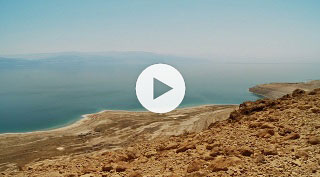The Future of Bible Study Is Here.
 Loading…
Loading…
You have not started any reading plans.
- More »
Sign in or register for a free account to set your preferred Bible and rate books.
17:1–7 The catalog of the kings of Israel and Judah (1 Kgs 15–16) is interrupted by a series of stories (chs. 17–2 Kgs 2) about the prophet Elijah |
17:1 As Yahweh lives, the God of Israel A statement indicating that a formal oath will follow.
there shall surely not be dew nor rain A form of divine punishment. Israel’s behavior determines the weather and fertility of the land (Deut 11:13–17; compare 1 Kgs 8:35; 18:41–46).
 Famines in the Bible Table
Famines in the Bible Table
Famine | Reference |
Three-Year Famine in the Time of David | |
Famine in the Northern Kingdom in the Time of Elijah and Ahab | |
Famine in the Time of Elisha |
these years According to 1 Kgs 18:1, the drought lasts for three years.
17:3 the Wadi Kerith An unidentified riverbed.
17:4 you shall drink from the wadi Indicates a miracle; riverbeds in Israel dried up for most of the year. Even their pools were dry during droughts.
the crows The Hebrew word used here, orev, likely refers to the short-tailed black bird corvus rhipidurus, which nests around the Dead Sea and Jordan Valley.
 Raven EBD
Raven EBD
17:7 after a while The Hebrew phrase used here, miqqets yamim (literally rendered as “at the end of days”) describes an indefinite number of days.
17:8–16 The drought mentioned in vv. 1–7 sets the stage for this scene. The story of the widow of Zarephath |
17:9 to Zarephath A Phoenician city on the Mediterranean coast.
17:10 a widow woman She was presumably newly widowed, since she could be recognized by her mourning garment (compare Gen 38:14).
17:12 As Yahweh your God lives The phrase indicates that a formal oath will follow.
17:13 a small bread cake The Hebrew word used here, ugah, also occurs in 1 Kings 19:6, where it is described as being cooked on a hot stone.
17:14 until the day Yahweh gives rain Three years later (18:1), after the drought and the accompanying famine.
17:15 and he ate with her household for many days Apparently Elijah lived with the widow and her son for at least a period of time (v. 19).
17:17–24 Elijah’s reviving of the widow’s son demonstrates the effectiveness of his petition and his ability to mediate divine power. It sets the stage for the more dramatic, large-scale events that follow (18:20–46). |
 Miracles of the Prophets Table
Miracles of the Prophets Table
17:17 no breath The Hebrew word used here, neshamah, describes the force that animates all living creatures (Gen 2:7; Deut 20:16; Josh 11:11, 14). Its loss marks the end of life (Job 34:14–15).
17:18 O man of God This title designates a prophet or messenger of God. It also is used in reference to Moses (Deut 33:1).
17:19 upper room where he was staying A Shunammite shows this same hospitality to Elisha (2 Kgs 4:10–11).
17:21 three times A common number in rituals.
the life of The Hebrew word used here, nephesh, is typically translated “soul,” but can also refer to “breath,” “life,” or “inner being.” See note on 1 Kgs 2:4.
17:22 he lived The Hebrew word chayah simply means “to live,” but is sometimes translated as “he revived.” The child is never referred to using the Hebrew word mwtmwt, meaning “dead.”
17:24 Now this I know, that The revival of the widow’s son elicits an affirmation of Elijah’s prophetic office, a response not present with the miracle of the flour and oil (v. 16).

|
About Faithlife Study BibleFaithlife Study Bible (FSB) is your guide to the ancient world of the Old and New Testaments, with study notes and articles that draw from a wide range of academic research. FSB helps you learn how to think about interpretation methods and issues so that you can gain a deeper understanding of the text. |
| Copyright |
Copyright 2012 Logos Bible Software. |
| Support Info | fsb |
